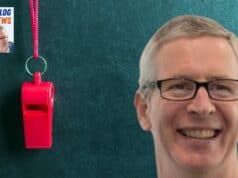Last week, I saw a number of news stories that caught my eye, non-manufacturing stories about systems (or lack thereof) and blame. What do the Transportation Safety Administration, the National Basketball Association, Detroit Public Schools and Northwest Airlines have in common? Poor systems… read on.
National Basketball Association (NBA):
You might have read about the NBA ref, Tim Donaghy, who accused of betting on (or possibly even fixing the outcome of games). The USA Today had an interesting article about the oversight (or lack thereof) with NBA officials:
An ineffective system for training and evaluating game officials helped allow possible illegal betting to go undetected, according to two veteran NBA referees and another who recently retired.
It's interesting to me that this article doesn't just point the finger of blame at the “bad ref.” If the charges against Donaghy are true, he must be held accountable, by his employer (well, he's already quit) and by the law. Looking for systemic causes or enablers isn't inconsistent with holding people accountable.
How many businesses have an “ineffective system for training and evaluating” employees? That's what the Training Within Industry program is supposed to help address right? Could that approach be applied to the NBA? Possibly.
The referees make it sound like the rules and guidelines for calling fouls are so open to interpretation that it's hard to teach and hard to hold refs accountable for not calling plays the right way. I reffed intramural basketball for two years in college and it's a very tough thing to learn and get good at. There's so much action, so fast (even in a typical college gym), that you can't possibly see everything or call everything consistently.
Can you use TWI rules to “break down” the job of a referee? There's a certain “art” to officiating, but that's true of so many other jobs. There are judgment calls, but it's also possible to have others validate or calibrate the judgment of each referee, to make sure they are calling games as consistently as possible.
I read in some other article (and now I can't find the reference) that the NBA *does* have “observers” who travel and rate the officials — were “calls” correct, were “non calls” correct even (basing a “non call” on the reaction of a bench or coaches). Unfortunately, it sounded like the qualifications for being an observer were pretty weak — no basketball refereeing experience was necessary.
No wonder that was called an “ineffective” system. Hiring observers with no experience makes about as much sense as a manufacturer hiring an engineer, fresh out of college, to supervisor workers in a department he or she knows nothing about (which probably still happens, it's not the Toyota Way approach to supervisor, where you'd tend to promote from the front line workers).
Next: Northwest Airlines
Please scroll down (or click) to post a comment. Connect with me on LinkedIn.
Let’s build a culture of continuous improvement and psychological safety—together. If you're a leader aiming for lasting change (not just more projects), I help organizations:
- Engage people at all levels in sustainable improvement
- Shift from fear of mistakes to learning from them
- Apply Lean thinking in practical, people-centered ways
Interested in coaching or a keynote talk? Let’s talk.
Join me for a Lean Healthcare Accelerator Trip to Japan! Learn More









